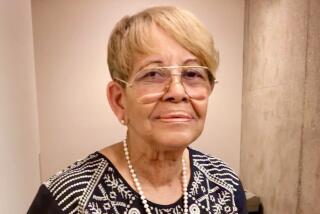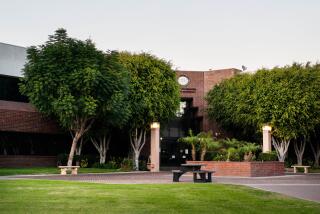15 New Doctors With a Mission: Legacy of Watts
- Share via
For Adelaide Willis, earning a medical degree Sunday as part of the first graduating class at Charles R. Drew Postgraduate Medical School was a triumph that carried with it a new set of tasks.
“It’s like being the first-born of a family,” said Willis, 29, a naturalized American citizen from Ghana. “You have certain responsibilities.”
As the first graduates of a school that was founded in response to rioting in Watts two decades ago and dedicated to bringing medical care to poor communities, she and her 14 peers in the Class of ’85 are setting precedents, Willis said.
She believes that class members “feel that whatever area they may go into, they have the commitment, the ‘Drew mission.’ ”
Affiliated with Martin Luther King Jr. General Hospital and the UCLA School of Medicine, Drew looks for students who will spend their careers in communities that have insufficient medical care, Stephen Keith, assistant dean for student affairs, said in an interview.
‘The Real Problems’
“Is it going to be on Wilshire Boulevard in Beverly Hills as a psychiatrist?” Keith asked. “Or is it going to be at Century and Avalon (in South-Central Los Angeles), where no one else is, taking care of the real problems?”
Applicants are not asked to make any formal pledge to work in poor areas, and it will be four or five more years--after graduates have completed their residencies and settled into practice--before it will be possible to measure the school’s success in selecting and training people who will be committed to the poor, Keith said.
“But we feel pretty good about them returning to areas such as Watts or East Los Angeles and setting up practice,” he added.
The Class of 1985, which initially had 21 students, graduated 15 doctors Sunday--eight women and seven men. There were eight blacks, five whites, one Latino and one Asian-American.
“For me, medical school was a dream come true, so I’m going to talk about dream makers,” graduate Kimberly Gregory, 25, said in an address during Sunday’s commencement exercises.
Gregory recalled the medical dreams of Charles R. Drew, the black pioneer of blood banking, and slain civil rights leader Martin Luther King Jr.’s dream of racial freedom and harmony.
‘We Embody the Dream’
“Perhaps, if we’re lucky and hard-working, we’ll achieve another dream,” Gregory said in a call for the graduates to fulfill the school’s mission of service. “We embody the dream of health care as a right, not a privilege, for all people, not just rich people.”
Drew tries to turn out graduates with great concern for issues such as “the impact of drug abuse, alcoholism and trauma in urban areas in the U.S., rather than CAT scanners and Alzheimer’s disease,” Keith said in the interview.
Founded in 1966, Drew also offers training to practicing physicians and students in medicine-related professions, such as radiology, with a total enrollment in 1984 of 408. It admitted its first class of medical students in 1981. Nearly 100 students seeking to be doctors are now enrolled.
Sunday’s graduates completed two years of basic medical school courses at UCLA and two years of clinical study at Drew, which is across 120th Street from King General.
The two years of clinical work, with King patients and in community outreach programs, bring students into regular contact with poor families and is intended to reinforce the social commitment of the graduates, Keith and several students said.
‘Give Something Back’
“You can’t come out of a program like this without feeling that you want to give something back,” said Diana Liley, 44, the oldest member of the graduating class, who worked as a nurse anesthetist at King General for eight years before beginning medical school.
Liley said that during her training at Drew, she worked at public health clinics, gave physicals to preschool children and cared for her own set of patients for two years.
“They want us to see it and experience it, and get out there and be part of it,” she said. “You can talk about these really needy patients all you want, but until you see them, and take care of them, it’s not real to you.”
Liley said she believes that among Sunday’s graduates, “pretty much everyone’s going to wind up doing the kinds of things they’d hoped to do when admitted.
“If I should go into private practice, I’d still feel obligated to give some faculty time to a program like this,” she said.
Liley, who credits Drew’s non-traditional approach with giving her an otherwise unattainable opportunity to become a doctor, recalled that when she was a child, “boys were doctors, girls were nurses.”
‘OK . . . Let’s See’
“I knew that from the time I was little,” she said. “In the 1970s, I started wanting to to be a doctor. It became OK for women to be doctors, but not for older people. I was always out of step. So when they started this school I said, ‘OK, this should be the time. . . . They say they’re interested in taking people who are non-traditional, who have already proven they have a commitment to under-served communities. Let’s see!’ ”
Willis said that she was attracted to Drew because she grew up in Ghana, an African nation that lacks sufficient health services.
After completing a residency in family practice at Martin Luther King, Willis said, she intends to look into ways of returning to Ghana to work for a few years.
“I’d like to work in both areas, even though this is going to be home,” she said.
“I do feel that we need to deliver more health care where it’s needed,” she added. “I don’t feel as though we made a promise per se. It’s more what your convictions are, I guess.”
Los Angeles Times
More to Read
Sign up for Essential California
The most important California stories and recommendations in your inbox every morning.
You may occasionally receive promotional content from the Los Angeles Times.













